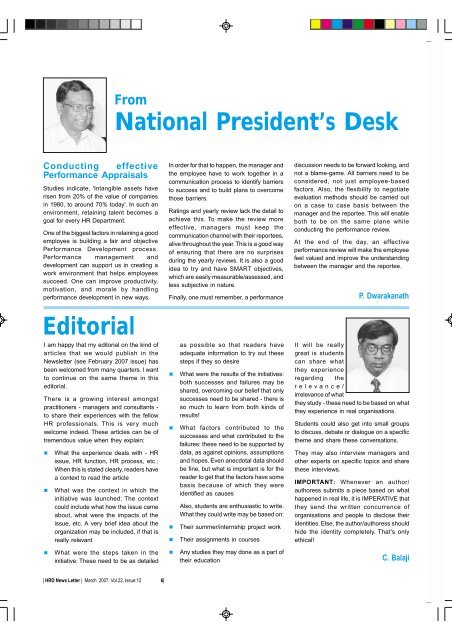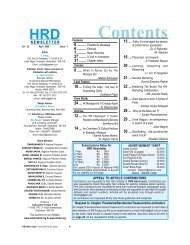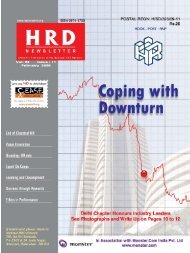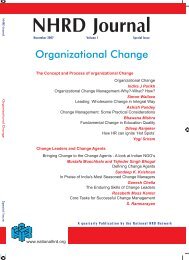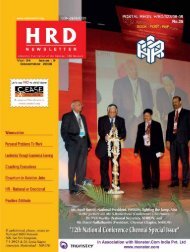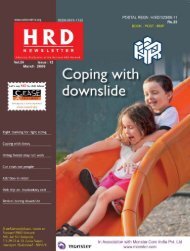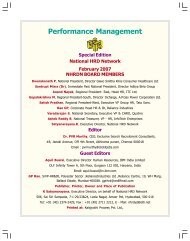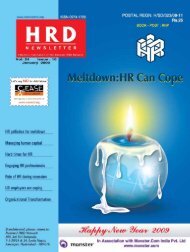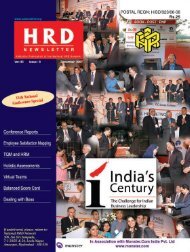Performance Management - National HRD Network
Performance Management - National HRD Network
Performance Management - National HRD Network
You also want an ePaper? Increase the reach of your titles
YUMPU automatically turns print PDFs into web optimized ePapers that Google loves.
From<br />
<strong>National</strong> President’s Desk<br />
Conducting effective<br />
<strong>Performance</strong> Appraisals<br />
Studies indicate, 'Intangible assets have<br />
risen from 20% of the value of companies<br />
in 1980, to around 70% today'. In such an<br />
environment, retaining talent becomes a<br />
goal for every HR Department.<br />
One of the biggest factors in retaining a good<br />
employee is building a fair and objective<br />
<strong>Performance</strong> Development process.<br />
<strong>Performance</strong> management and<br />
development can support us in creating a<br />
work environment that helps employees<br />
succeed. One can improve productivity,<br />
motivation, and morale by handling<br />
performance development in new ways.<br />
In order for that to happen, the manager and<br />
the employee have to work together in a<br />
communication process to identify barriers<br />
to success and to build plans to overcome<br />
those barriers.<br />
Ratings and yearly review lack the detail to<br />
achieve this. To make the review more<br />
effective, managers must keep the<br />
communication channel with their reportees,<br />
alive throughout the year. This is a good way<br />
of ensuring that there are no surprises<br />
during the yearly reviews. It is also a good<br />
idea to try and have SMART objectives,<br />
which are easily measurable/assessed, and<br />
less subjective in nature.<br />
Finally, one must remember, a performance<br />
discussion needs to be forward looking, and<br />
not a blame-game. All barriers need to be<br />
considered, not just employee-based<br />
factors. Also, the flexibility to negotiate<br />
evaluation methods should be carried out<br />
on a case to case basis between the<br />
manager and the reportee. This will enable<br />
both to be on the same plane while<br />
conducting the performance review.<br />
At the end of the day, an effective<br />
performance review will make the employee<br />
feel valued and improve the understanding<br />
between the manager and the reportee.<br />
P. Dwarakanath<br />
Editorial<br />
I am happy that my editorial on the kind of<br />
articles that we would publish in the<br />
Newsletter (see February 2007 issue) has<br />
been welcomed from many quarters. I want<br />
to continue on the same theme in this<br />
editorial.<br />
There is a growing interest amongst<br />
practitioners - managers and consultants -<br />
to share their experiences with the fellow<br />
HR professionals. This is very much<br />
welcome indeed. These articles can be of<br />
tremendous value when they explain:<br />
n<br />
n<br />
What the experience deals with - HR<br />
issue, HR function, HR process, etc.:<br />
When this is stated clearly, readers have<br />
a context to read the article<br />
What was the context in which the<br />
initiative was launched: The context<br />
could include what how the issue came<br />
about, what were the impacts of the<br />
issue, etc. A very brief idea about the<br />
organization may be included, if that is<br />
really relevant<br />
n<br />
n<br />
n<br />
n<br />
as possible so that readers have<br />
adequate information to try out these<br />
steps if they so desire<br />
What were the results of the initiatives:<br />
both successes and failures may be<br />
shared, overcoming our belief that only<br />
successes need to be shared - there is<br />
so much to learn from both kinds of<br />
results!<br />
What factors contributed to the<br />
successes and what contributed to the<br />
failures: these need to be supported by<br />
data, as against opinions, assumptions<br />
and hopes. Even anecdotal data should<br />
be fine, but what is important is for the<br />
reader to get that the factors have some<br />
basis because of which they were<br />
identified as causes<br />
Also, students are enthusiastic to write.<br />
What they could write may be based on:<br />
Their summer/internship project work<br />
Their assignments in courses<br />
It will be really<br />
great is students<br />
can share what<br />
they experience<br />
regarding the<br />
relevance/<br />
irrelevance of what<br />
they study - these need to be based on what<br />
they experience in real organisations.<br />
Students could also get into small groups<br />
to discuss, debate or dialogue on a specific<br />
theme and share these conversations.<br />
They may also interview managers and<br />
other experts on specific topics and share<br />
these interviews.<br />
IMPORTANT: Whenever an author/<br />
authoress submits a piece based on what<br />
happened in real life, it is IMPERATIVE that<br />
they send the written concurrence of<br />
organisations and people to disclose their<br />
identities. Else, the author/authoress should<br />
hide the identity completely. That's only<br />
ethical!<br />
n<br />
What were the steps taken in the<br />
initiative: These need to be as detailed<br />
n<br />
Any studies they may done as a part of<br />
their education<br />
C. Balaji<br />
| <strong>HRD</strong> News Letter | March 2007, Vol.22, Issue:12 6|


